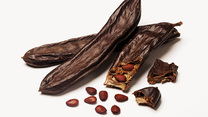
Carob is more than just a substitute for chocolate. It's use for health benefits goes back 4,000 years. There is even mention of carob in the Bible as “St. John’s bread” or “locust bean.”
Carob is an evergreen flowering shrub, belonging to the pea family and native to the Mediterranean region. The carob shrub produces dark brown pods filled with brown pulp and tiny seeds. Today, the pods are dried and ground into powder, processed and turned into carob gum.
Health Benefits
Aids With Digestive Disorders - including diarrhea, heartburn, and the intestine’s inability to properly absorb certain nutrients from food. These absorption disorders include celiac disease.
Reduces High Cholesterol - Carob fiber has been shown to be highly effective against high cholesterol. Studies have shown that people given carob fiber significantly reduce the presence of LDL cholesterol (bad cholesterol). Reducing the dangerous form of cholesterol can reduce the chances of various cardiovascular diseases, including high blood pressure, atherosclerosis, heart attacks, and strokes.
Encourages Weight Loss - Carob is a nondairy alternative to chocolate, for those with lactose intolerance or milk allergies. It's lower in fat, calories and caffeine than chocolate. The fiber found in carob is somewhat special, in that it inhibits the secretion of postprandial ghrelin, a hormone that tells the body that it's hungry. This means that carob can reduce the chances of over eating, and therefore aid in weight loss.
Has Many Important Nutrients -
Vitamin E content in carob helps in treating cough, flu, and anemia
Phosphorus and Calcium help fight against osteoporosis.
Regular use of carob helps in preventing lung cancer.
Sources:
-Web MD
-Sfgate Healthy Eating - The Many Health Benefits of Carob to the Human Body, by Maia Appleby
-Organic Facts - Health Benefits of Carob
Carob is an evergreen flowering shrub, belonging to the pea family and native to the Mediterranean region. The carob shrub produces dark brown pods filled with brown pulp and tiny seeds. Today, the pods are dried and ground into powder, processed and turned into carob gum.
Health Benefits
Aids With Digestive Disorders - including diarrhea, heartburn, and the intestine’s inability to properly absorb certain nutrients from food. These absorption disorders include celiac disease.
Reduces High Cholesterol - Carob fiber has been shown to be highly effective against high cholesterol. Studies have shown that people given carob fiber significantly reduce the presence of LDL cholesterol (bad cholesterol). Reducing the dangerous form of cholesterol can reduce the chances of various cardiovascular diseases, including high blood pressure, atherosclerosis, heart attacks, and strokes.
Encourages Weight Loss - Carob is a nondairy alternative to chocolate, for those with lactose intolerance or milk allergies. It's lower in fat, calories and caffeine than chocolate. The fiber found in carob is somewhat special, in that it inhibits the secretion of postprandial ghrelin, a hormone that tells the body that it's hungry. This means that carob can reduce the chances of over eating, and therefore aid in weight loss.
Has Many Important Nutrients -
Vitamin E content in carob helps in treating cough, flu, and anemia
Phosphorus and Calcium help fight against osteoporosis.
Regular use of carob helps in preventing lung cancer.
Sources:
-Web MD
-Sfgate Healthy Eating - The Many Health Benefits of Carob to the Human Body, by Maia Appleby
-Organic Facts - Health Benefits of Carob
 RSS Feed
RSS Feed
